About Philip Meersman
Philip Meersman is a Belgian experimental poet with a
strong interest in visual and sound poetry, very much in the tradition
of Soviet Russian poets like Velimir Chlebnikov, futurist Italian poets
like Paolo Buzzi, Aldo Palazzeschi, Corrado Govoni, Filippo Tommaso Marinetti,
or the young Salvatore Quasimodo, and of course Paul van Ostaijen. But
Meersman has also been influenced by pioneers of concrete poetry like Ian
Hamilton Finlay, Max Bense, Eugen Gomringer, and Franz Mon.
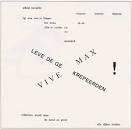
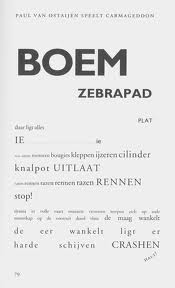
Poems by Paul van Ostaijen
Clearly, to be part of such challenging poetic traditions
that were immensely experimental implies also the desire to continue in
this vein & push further into new 'terrain,' thus transcending that
heritage. And this is what Meersman does. He ventures into performance
art and combines the visual element of both performance and integrated
video art with radical sound poetry. Such poetry can be subversively anti-war,
it can tackle contradictions of contemporary Western consumerist society,
and it can also become pure word play, an anarchical incantation of joyful,
ironic, angry, sad, and desperate pre-logical sounds. From the expressive
function of language to the exhortative, the full range of possibilities
is tested, challenging the audience to discard all preconceptions and conventional
expectations. For good reason Meersman sees himself as a man who is simultaneously
an experimental poet-painter-&-conceptual artist.
Philip Meersman commenced his creative career in the mid-1980s,
not only as a poet (and sculptor) but also, significantly, as an actor
– which explains perhaps, in part, his later turn to performance art. He
performed at the time in seventeen plays, but soon became active as a dramatist,
too. As a director-playwright he created original plays and translated
the play "The Carp" by Bulgarian playwright Rumen Shomov. Together with
Lieven Vercauteren he wrote two plays, “Flight 39.1” in 1996, and "Naspel"
in 2003. Vercauteren and Meersman also worked jointly on the project
"de min." In 2005, Meersman created "mijn (W)oor(D) mijn" –
an in situ project on current affairs.
In the vein of Mike Horovitz and Pete Brown, early European
pioneers of poetry and jazz performances (that were echoed later, in Germany,
by Peter Rühmkorf), Philip Meersman has championed poetry & music
performances in Belgium. In 2006, he was a key performer during the 1st
International Music and Poetry Festival Portus Ganda in Ghent, and continued
in this vein at the 10th Curtea Poetry Nights in Romania during the same
year. As a poet interacting with musicians, he proved a talented improviser
who was able to fascinate the audience both by his performative skill as
an actor and by the 'bandwidth' of his audial expressivity. Turning into
a star as a poet performer in Belgium, he was invited during the same year
to work with Fernando Arrabal during the Lire en Fête in Metz
(Lorraine, France). Several international poets collaborated with him,
jointly realizing performances of his improvisation poems, “Feuerwerkgedichte
ohne Feuer” (Firework Poems Without Fire).
Meersman's preparedness to take a stand and intervene
in the public arena became very apparent when he, together with
Sergei Birjukov (RUS) and Peter Waugh (GB), performed "Bar None,"
defined as a "poetic action" intended to agitate the public. The explicit
goal of this performance was to defend universal freedom of speech, but
the subtitle of the performance – "48h non-stop reading of poetry in a
cage (wearing orange overalls)" – as well as the overalls worn and
the cage placed on stage make the critical reference to Guantanamo explicit.
The group formed by Birjukov, Waugh and Meersman defines itself as an international
sound poetry collective, baptized "dastrugistenda" by the three co-founders,
who see themselves as self-proclaimed DAstrugistenDA – a term that alludes
to "dada" and the poetry of Richard Huelsenbeck, Tristan Tzara, Kurt Schwitters,
and so on. The Dutch component "strugisten" [i.e., strugists] refers
to the fact that the poetry collective was founded in Struga, Bulgaria.
While experimenting with language (and writing also more
conventional poetry), Meersman is vividly focused on visual-touchable poetry,
performance poetry and 3D poetry.
He interprets the gesamtkunstwerk that comprises
the physical performance of the poet, the aural dimension and the visual
placement of letters on a physical support (– a visual image that can be
beamed onto a screen during the performance!) as a combination of elements
that are dialectically interrelated. As was the case already with Italian
futurist visual poetry, the performing poet Philip Meersman, or another
performer, or the reader approaching such poetry on his own, must determine
how to proceed from one written visual element placed on the support to
another. The support (not necessarily the page of a book although this
is often a preferred option) and the elements of the support become a score
– not of a musical composition, but of noises, of sounds, of phonemes,
of words. The basic approach that will make the audible realization possible
can be described as a principle emphasized first by John Cage in music
– indeterminacy. By remaining faithful to this concept, the improvising
performer reveals an attitude characteristic of the anarchist homo ludens.
The pre-logical, implicit content of the performance points to its counterpart:
committment, an attitude typical of the human being who cares for
and about something that is not yet, but that should be allowed
to sprout. This something is largely absent in our world, and the poet
Philip Meersman is aware of it, It is freedom that his poetry evokes, as
a desire, as a possibility.
fields of theatre, poetry and plastic arts since
1984.
Willard Bohn called him "[e]ndlessly inventive, creatively
confrontational," and "eager to transgress" poetic conventions.
The extraordinary work of concrete, visual and sound poet Philip Meersman
has been described as “overwhelming and wonderful” with a style that permits
the concept of an international language, underlying his strong anti-war
stance. In This Is Belgian Chocolate: Manifestations of Poetry, Meersman
translates sound into verse and verse into sound, creating an experiential
form that is a pleasurable, immersive read.
Philip Meersman was born on May 5th, 1971 in Sint-Niklaas, a Flemish
town not far from Antwerp. He lives at present in Jette, located
in the metropolitan area of the Belgian capital, Brussels (Brussel/Bruxelles).
- A.B. Meadows
Sources / links:
Yves Joris, "Recensie: Philip Meersman – This is Belgian chocolate,"
in: TZUM.INFO,
August 22, 2014; and in: Meander
/ literair e-zine, August 2014.
Marijntje Gerling, "Philip Meersman - Manifest voor de poëzie
Een eigentijdse reliek," in: Meander
/ literair e-zine, January 2013.
Philip Meersman, "One Way of Looking at Vispo" [i.e., at visual poetry],
in: Cold
Front Mag, August 30, 2014
Phiöip Meersman, "Philip Meersman: Sound poems: Summary," in:
Nokturno,
n.d.
Philip Meersman, "Tableau Vivant III (Reading the rain)", in: reconfigurations,
Dec. 2011.
"Bio: PhilipMeersman," in: SPOONINMYBRAIN.
go back to Street
Voice # 5, Contents
|
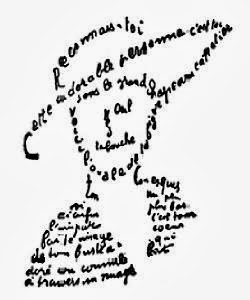
G. Apollinaire
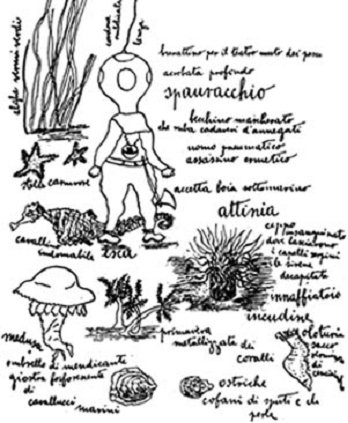
C. Govoni, Rarefazioni e parole in libertà (1915)
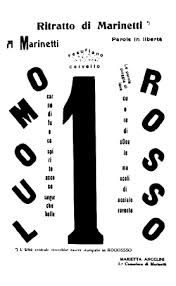
Ritratto, a poem by Marinetti (1916)
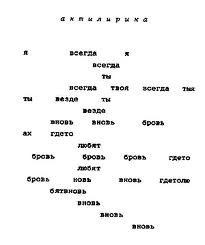
A poem by Velimir Chlebnikov
|
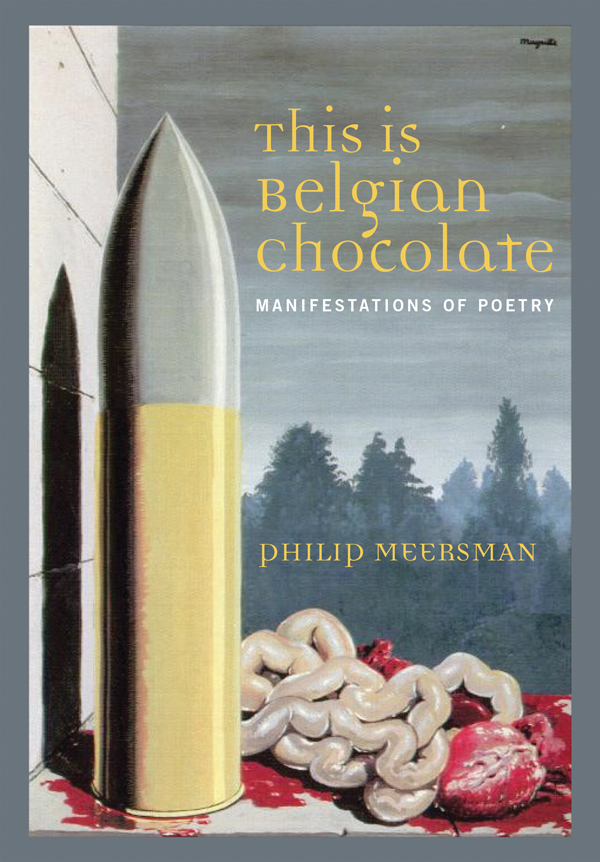
Philip Meersman, This Is Belgian Chocolate:
Manifestations of Poetry. New York : Three Rooms Press, Nov. 2014.
ISBN 978-1-941110-01-0; 120 Pages; $15.95
Cover: Le Témoin by René Magritte (© Ch. Herscovici
- SABAM Belgium 2014)
Three Rooms Press is a New
York-based independent publisher. Since 1993, it has been active as a publisher
of fiction, memoirs, poetry translations, drama and art. Three Rooms Press
has initiated and promotes a variety of literary and cultural events in
New York, San Francisco, Los Angeles, Paris, Berlin, London, Corsica and
more, including readings, plays, workshops and concerts.
|
.
|